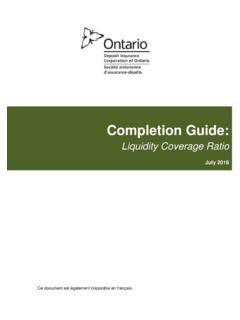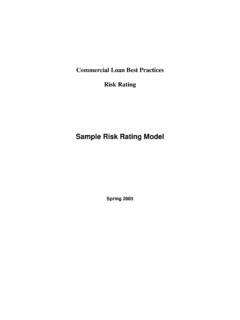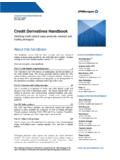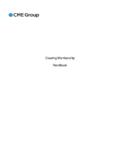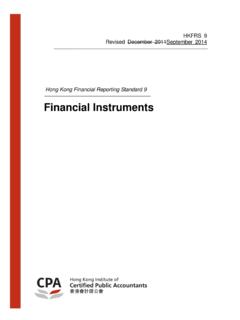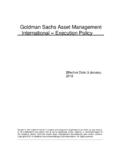Transcription of DEPOSIT INSURANCE CORPORATION OF ONTARIO …
1 DEPOSIT INSURANCE CORPORATION OF ONTARIO . BY-LAW NO. 5. STANDARDS OF SOUND BUSINESS AND FINANCIAL PRACTICES. A By-law made under paragraph (g) of subsection 264(1) of the Credit Unions and Caisses Populaires Act, 1994 to prescribe standards of sound business and financial practices for credit unions. Throughout this By-law, the term credit union also refers to caisse populaire . and league . BE IT ENACTED as By-law No. 5 of the DEPOSIT INSURANCE CORPORATION OF. ONTARIO (hereinafter called the "DICO"), subject to the approval of the Lieutenant Governor in Council, as follows: The standards set out DICO's minimum requirements regarding sound business and financial practices for credit unions. The standards are designed in such a way to make them adaptable to every credit union regardless of size or complexity, recognizing that approaches will differ among credit unions. DICO will consider material non-compliance with this By-law as evidence that a credit union is: in breach of the standards of sound business and financial practices for the purposes of cancellation of DEPOSIT INSURANCE under subsection 274(1) of the Credit Unions and Caisses Populaires Act, 1994 (the Act ); or conducting its affairs in a way that might be expected to harm the interests of members or depositors or that tends to increase the risk of claims by depositors against DICO for the purposes of ordering a credit union under Supervision under subsection 279(1) of the Act.
2 All credit unions are required to comply with the standards of sound business and financial practices outlined in this by-law. Guidance for meeting the standards is provided for credit unions in DICO's Guidance Notes, Reference Manual on Sound Business and Financial Practices, Director's Handbook, Audit Committee Handbook, Self-Assessment Workbooks, Examination Manual, Enterprise Risk Management (ERM) Framework and other related publications, as may be amended from time to time. A credit union should ensure that adequate planning is in place and processes developed to address the increase in risk and additional requirements and expectations as the credit union becomes larger and more complex. Reporting Requirements At least annually, the board of directors of a credit union shall review and assess the operations of the credit union and submit to DICO within 75 days of the end of the financial year, a board resolution, using the template outlined in Appendix A confirming that: DICO By-law No.
3 5: Standards of Sound Business and Financial Practices (2018) 1. management has provided a representation letter to the board of directors regarding its assessment of adherence to management's responsibilities under the standards of sound business and financial practices; and the board of directors is familiar with, and is acting in compliance with the standards of sound business and financial practices. STANDARDS. SECTION A: CORPORATE GOVERNANCE. All credit unions are expected to address the minimum requirements as set out below. 1. Corporate Governance: Board of Directors The board of directors is ultimately responsible for ensuring that the credit union is operated in a safe and prudent manner and for ensuring adherence to these standards of sound business and financial practices. In fulfilling its responsibilities, the board of directors should ensure that the credit union is consistently operating in accordance with co-operative principles.
4 At a minimum, the board of directors shall: understand and fulfill its responsibilities;. exercise independent judgement;. establish the training requirements and qualifications for directors and members of the audit committee;. establish appropriate and prudent risk management policies (refer Section B), oversee risk management policies and obtain reasonable assurance that the credit union is adhering to its risk management policies for significant risks;. establish the responsibilities, accountability and authority of the CEO, the audit committee and other board committees as applicable;. establish standards of business conduct and ethical behaviour;. select and evaluate the effectiveness of the CEO;. ensure that management is appropriately skilled and experienced to implement the board's objectives;. establish the business objectives of the credit union consistent with co- operative principles and approve the credit union's business strategy and business plans.
5 Evaluate the credit union's actual operating and financial results against business plans and address any material variances;. evaluate the effectiveness of the board and oversee the responsibilities of the audit committee;. ensure that employee compensation plans are consistent with prudential incentives; and affirm a control environment and ensure that the credit union is in control. DICO By-law No. 5: Standards of Sound Business and Financial Practices (2018) 2. 2. Corporate Governance: Audit Committee The audit committee supports the board of directors through oversight responsibilities relating to financial reporting and disclosure, internal audit, external audit, risk management, controls and compliance. The committee's understanding and oversight are critical for safeguarding assets of all stakeholders of the credit union. At a minimum, the audit committee shall: develop a work plan for all meetings for the year that addresses all the duties and responsibilities set out in the Act and Regulations made under the Act.
6 Oversee an independent internal audit function to evaluate internal controls and ensure that management has mitigated any material weaknesses;. take all reasonable steps to ensure that the credit union is in compliance with the Act, its Regulations and other legislative requirements; and ensure appropriate follow-up on all outstanding issues, weaknesses and deficiencies including findings and recommendations of examinations and internal and external auditors. 3. Corporate Governance: Management Management is responsible to ensure that the management and staff of the credit union applies the processes, procedures and controls necessary to prudently manage the risk and to provide the board of directors with timely, relevant, accurate and complete information to enable it to assess that delegated responsibilities are being discharged effectively. At a minimum, management shall: implement appropriate and prudent risk management policies, procedures and controls (refer to Section B).
7 Monitor the effectiveness of risk management practices and controls for the credit union's significant risks;. develop and implement an appropriate and prudent business strategy and business plans; and provide the board of directors with timely, relevant, accurate reports on the implementation of the credit union's business strategy, business and financial plans and any material risk that may affect the business objectives and financial stability of the credit union. SECTION B: RISK MANAGEMENT POLICIES. All credit unions are expected to develop and implement appropriate and prudent risk management policies, including the following: Capital Management The fundamental elements of capital management include implementing a policy that, at a minimum, addresses: the quantity, quality and composition of capital needed that reflect the inherent risks of the credit union and to support the current and planned operations;. distribution of dividends and redemptions of capital instruments to members.
8 And monitoring and board reporting requirements. DICO By-law No. 5: Standards of Sound Business and Financial Practices (2018) 3. Credit Risk Management The fundamental elements of credit risk management include implementing a policy that, at a minimum, addresses: authorized types and classes of credit instruments;. limits or prohibitions on credit exposures including concentration;. assessment criteria and security requirements for each authorized credit instrument;. an effective credit assessment system;. defined and prudent levels of decision making authority for approving credit exposures;. management of delinquent and impaired loans; and monitoring and board reporting requirements Operational Risk Management The fundamental elements of operational risk management include implementing a policy that addresses: defined and prudent levels of decision-making authority;. the security and operation of a management information system;. technology development and maintenance.
9 Safeguarding of the institution's premises, assets and records of financial and other key information;. disaster recovery and business continuity plans;. outsourcing of services;. internal controls;. internal audit; and monitoring and board reporting requirements. Market Risk Management The fundamental elements of market risk management include implementing a policy that, at a minimum, addresses: authorized types, limits and concentration of investments, other financial instruments, and assets;. defined and prudent levels of decision-making authority;. identifying, measuring, providing for and recording market impairments; and monitoring and board reporting requirements. Structural Risk Management The fundamental elements of structural risk management include implementing a policy that, at a minimum, addresses: limits on the balance sheet mix and maturities of capital, deposits, loans and investments;. criteria for pricing of deposits and loans.
10 Limits on the exposure to foreign currency risk;. limits on the exposure to changes in interest rates;. DICO By-law No. 5: Standards of Sound Business and Financial Practices (2018) 4. use of appropriate techniques for measuring the institution's structural risk and evaluating the potential impact under current and reasonably foreseeable scenarios;. the use of analysis and appropriate consultation for the purchase of derivatives;. and monitoring and board reporting requirements. Liquidity Risk Management The fundamental elements of liquidity risk management include implementing a policy that, at a minimum, addresses: limits on the sources, quality and amount of liquid assets to meet normal operational, contingency funding for significant DEPOSIT withdrawals and regulatory requirements; and monitoring and board reporting requirements. SECTION C: ENTERPRISE RISK MANAGEMENT. Each credit union is expected to implement a comprehensive enterprise wide risk management (ERM) framework that is appropriately scaled to recognize its size, complexity and risk profile.

